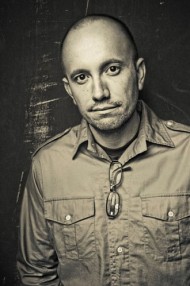I want to call your attention to two great blog posts in recent days about doubt. The first comes from Rachel Held Evans, who asks Is doubt a trend?
Personally, I’ve been accused of writing O Me of Little Faith because I’m part of a movement in Christian history where doubt is “cool.” This is one of those accusations that bothers me, because it assumes a couple of things: 1) that somehow I like being a doubter and am drawing on it or fostering it for personal gain; and 2) that my book is merely a capitalization on that trend.
I always want to reply that it’s a good thing I had the foresight 20 years ago to start asking hard questions and gathering material for this book, so I could have it written by the time the trend hit. Cultural prognostication must be my spiritual gift!
I’m cynical and opportunistic, but not THAT cynical and opportunistic.
BUT, I can’t deny that doubt is part of the zeitgeist these days among Christians. Rachel and I both pitched and began writing our books around the same time in 2008. We didn’t know each other then, but we both were experiencing similar cracks in our faith, and felt compelled to write about them. David Dark’s book, The Sacredness of Questioning Everything, hit shelves a few months before our own.
Is that just a coincidence? Or evidence of something larger? Rachel suggests the “doubt trend” was a long time coming, and it’s more than a passing fad:
…I agree that doubt is a
trend–but not in a slap-bracelets/skinny jeans/iced latte sort of a
way; more in a Copernican Revolution/Renaissance/postmodernism sort of a
way.…we are living through one of those pivotal times right now as changes
related to biology (evolution), physics, psychology, higher criticism,
and the Information Age raise serious questions about the Bible,
religious pluralism, authority, and faith.
The world is changing and Christians are changing with it. To
expect the Church to pass through such a significant cultural shift
without any of its members experiencing doubt is simply unrealistic.
I completely agree, and like Rachel (and Phyllis Tickle, whom she quotes), I think we’re entering a period where the Church will go through some seismic discomfort. It will have to find ways to respond, satisfactorily, to these scientific advances that challenge Christianity. And it’ll need to do it without drawing battle lines, without saying “either believe this or you’re out.” If it can’t do that, it will lose many from this generation of doubters, who are moving way past the point where we’re trying to avoid doubt. We’d rather learn how to survive it.
Which leads to the second post you should read. It was written last week by Ray Hollenbach, a frequent commenter here and at Rachel’s blog. Ray is one of those guys who asks hard questions — especially of writers like Rachel and me who have made our doubts public. But he does it in a humble, honest way. Ray seems to be seeking understanding rather than looking for a fight, and I appreciate it.
Ray’s recent post — The Limits of Doubt — is worth reading. He says that doubt belongs in the Christian story and should not exclude us from worship, but also expresses some hesitations about doubt. It can be “a needed correction within some quarters of Christianity,” he says, but does it come with a price?
Ray lists six considerations to remember:
1. Doubt can be the evidence of the Holy Spirit at work. Could the questions of our generation be a way of turning the Church back toward the Kingdom and away from political, cultural, social, or intellectual agendas?
2. Never trust anyone who hasn’t wrestled with doubt. Why? Because Jesus is an equal-opportunity offender, and if his words don’t cause you to ask hard questions, you’re not hearing them right. Totally agree.
3. Don’t confuse doubt with seeking. “Sometimes,” Ray writes, “we doubt to avoid seeking,” as if doubt is a way to be impartial and rise above the fight. I confess that this is often a mindset I find myself sliding into. I am tempted to hide behind doubt in order to stay disengaged.
4. Doubt is not the opposite of faith. Citing Os Guinness, Ray says doubt shouldn’t be confused with unbelief, which springs from the will, but instead is something that springs from honesty or confusion. Bingo.
5. My doubts are my doubts — they don’t have to be yours. This is worth remembering. I can’t create a personal orthodoxy of doubt and think less of you if you’re not asking the same questions I’m asking. My calling is not to change your mind.
6. The object of faith is a Person, not a proposition. Am I doubting my understanding of God, or am I doubting God himself? This question is perhaps more complicated than Ray suggests, since the process of knowing God in a relationship is based on the Bible, personal experience, prayer — and these things are major factors in my doubt. Since God is not sitting next to me, the only way I know him is through these filters of religion and personal seeking — and these are things that play a big role in my doubt. I’m limited by my humanity, and my humanity causes me to doubt. But it’s still worth remembering that faith is a relationship, not a set of doctrines.
Some great conversations continuing to occur. Both Rachel and Ray have blogs are worth following (as does Rachael Ray, I guess, if you’re into that sort of thing).
————–
What do you think? Is doubt a trend? Are there any considerations about doubt you’d add to Ray’s list?

